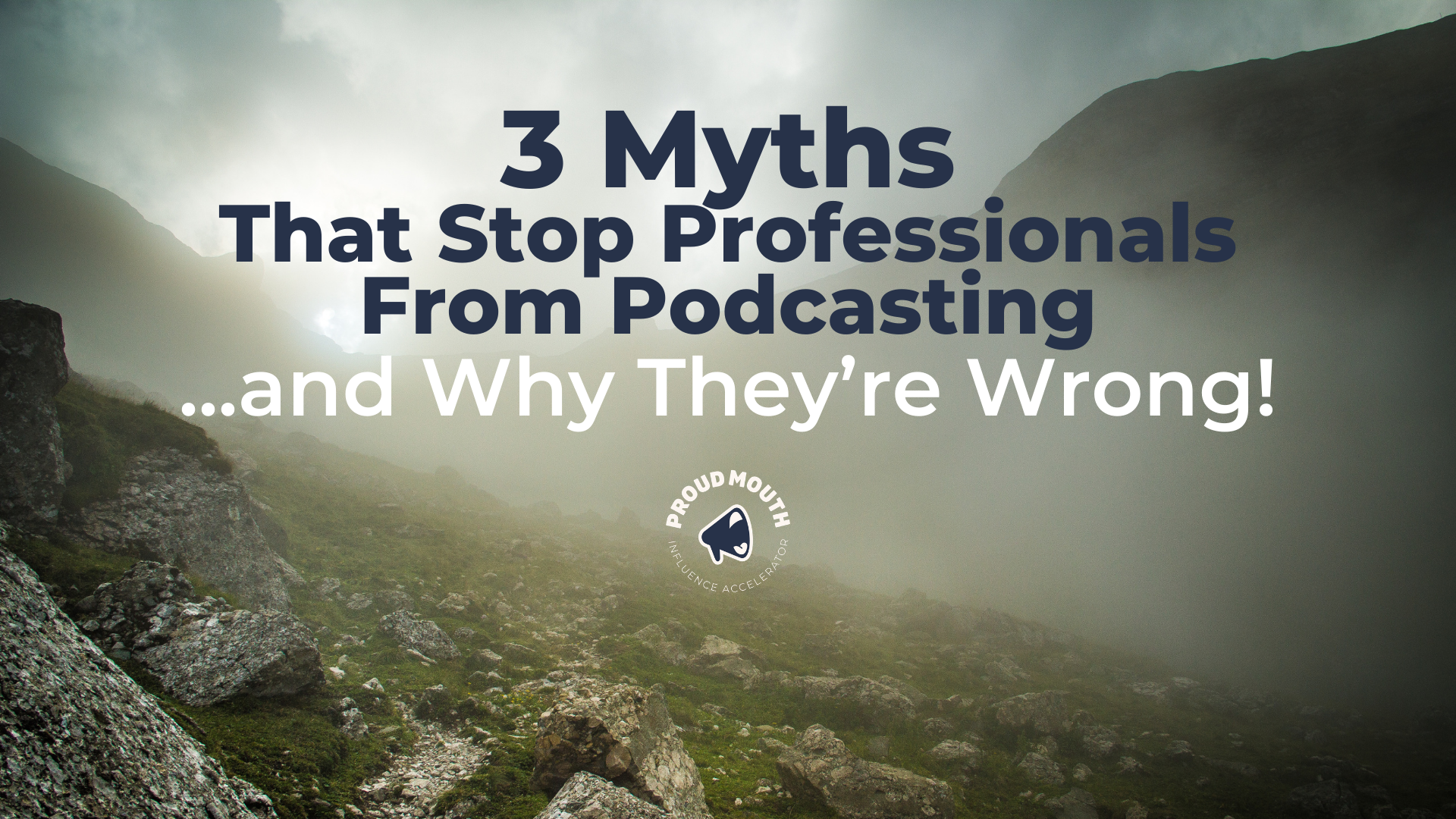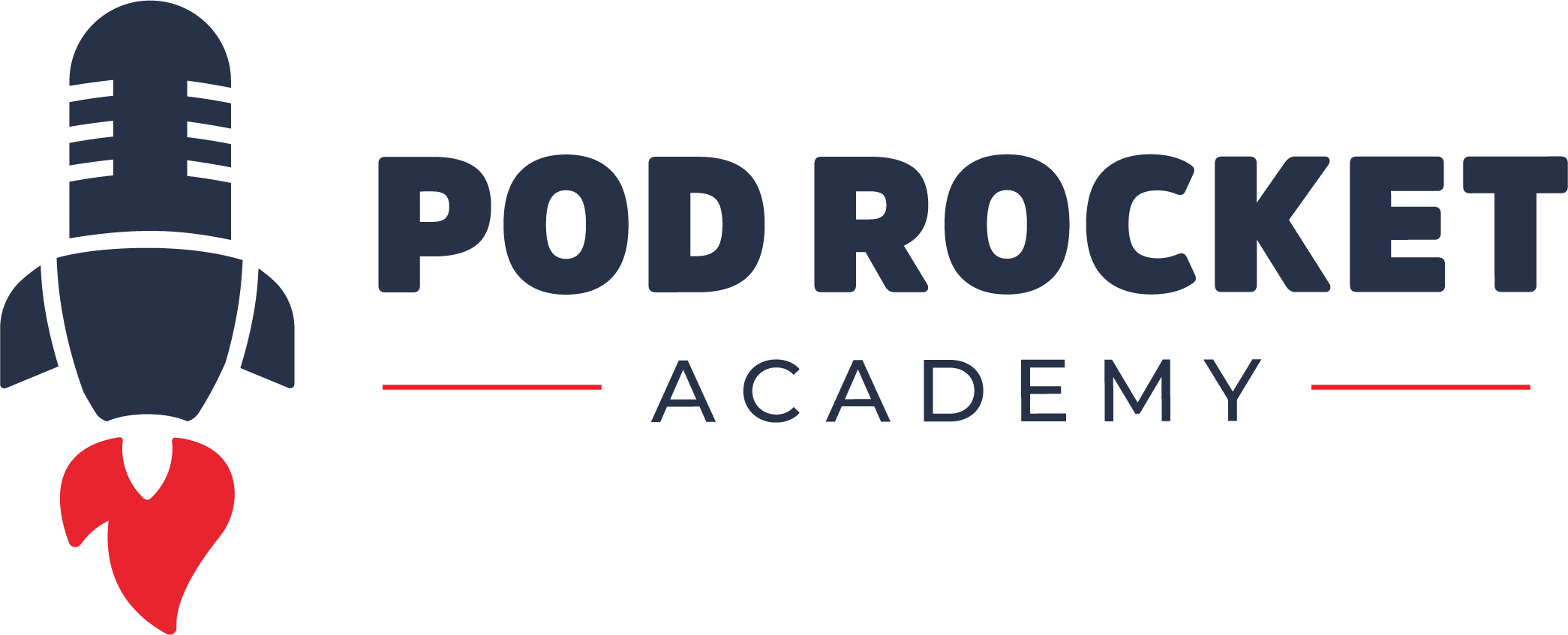3 Myths That Stop Professionals From Podcasting
Podcasting is a game-changer for experts (i.e. individual professionals and companies) that want to be seen as subject matter authorities.
An inherently intimate medium, podcasts give experts deep and instant credibility with their ideal prospects, top-of-mind-awareness without interrupting their audience, and attract the clients they enjoy working with the most.
But despite the numerous benefits, too many experts are reluctant to start a podcast because they believe three myths.
Here are the three myths and why they’re wrong…
Myth 1: Only polished presenters will be good at podcasting
Back in 2017, I met my business partner Matt Halloran at a conference in Scottsdale, Arizona. A relationship began to take shape as we explored opportunities for us to leverage each other’s strengths in business.
I remember one day we were reflecting on the struggle to produce thought leadership on a consistent basis. Matt mentioned that he had a broadcasting background and was adept at various media. I can’t recall the exact conversation or moment that we decided to start the Top Advisor Marketing Podcast, but podcasting has ignited so much for both Matt and me in our business.
But at first, I was apprehensive about being “on a podcast.” I’ve always been more comfortable writing blog posts and papers or being in small meetings. When I talked to Matt about this, he quickly compared podcasting to a one-on-one conversation –– a comfortable strength of mine and so many other experts. And really, that’s exactly what podcasting is: an engaging conversation. The best podcasts make the listeners feel like they are eavesdropping on a valuable conversation without the platitudes that would make it feel like a “sales presentation.” To a degree, polish can ruin a podcast, or at least make it feel disingenuous.
I’ve done many webinars over the years. I find that webinars are more scripted, pointed, and lack the storytelling and banter that learners yearn for: That “give it to me straight” dialogue that’s so much easier to express without feeling the need to sell. Webinars, for example, are challenging to pull off with authenticity because it’s difficult to read the crowd or play off them because you can’t actually engage them in a real conversation the way you can with a guest on your podcast
Myth 2: Podcasting will never be the perfect article
The process for writing an article gives thought leaders the opportunity to identify the best points, frame them properly, create flow and context, and take the necessary time to perfect their delivery via the written word. It’s a safe process.
Podcasting feels less safe. And a good podcast shouldn’t be outright scripted because it ruins the authenticity that makes podcasts…well, podcasts. A good article doesn’t have that undeniable intimacy and credibility that a good podcast does.
Adjectives can’t compete with heartfelt gestures and personality. And no one can deny that you’re the true author of your ideas, insights, and stories.
So maybe, just maybe, a podcast is the perfect article!
Myth 3: Podcasting is oversaturated, no one is listening, and it won’t move the needle for my business
You’d think from listening to nouveau podcasting experts that everyone and their pet iguana has a podcast these days.
They don’t.
Podcasting is growing with a notable surge in the number of podcasts and listeners but with substantial room available for new participants. For a more apples-to-apples comparison, there are close to two billion websites and two billion new blog posts published each year to over 600 billion blogs. Podcasting is not even close to being oversaturated, although I do get asked if it is…
Podcast Insights, the industry-leading podcast education site, highlights the rapid growth of podcasting, pointing to numerous sources that verify that the total number of podcasts was in the 500,000 range in 2018 and there are well over 1 million today.
Podcast audiences are growing and the frequency of listenership is robust, to say the least. As a matter of fact, monthly podcast consumers crested over 100 million Americans for the first time in 2020, according to surveys by The Infinite Dial® from Edison Research and Triton Digital. The same surveys report that 75% of the U.S. population is now familiar with the term “podcasting,” up from 60% in 2017; while 55% of the U.S. population has listened to at least one podcast, up from 40% in 2017. Statistics also show that podcast listeners are affluent, educated, and loyal as they listen to an average of seven shows per week.
What’s really driving podcast success, however, is its intimacy.
As writer Miranda Katz articulates so well, “[This] medium is inherently intimate, and easily creates a one-sided feeling of closeness between listener and host — the sense that the person talking into your ear on your commute is someone you know, whose product recommendations you trust, and whose work you want to support.”
This intimacy is why podcast advertising is increasingly sought after. Podcast audiences are in the moment and the right ads and sponsors are significantly more engaged than other media types.
A Nielsen study for podcast advertising by Midroll showed that podcast ads are 4.4 times more effective than display ads. Exposure to ads in podcasts leads to an average 10% uplift in purchase intent. In fact, 61% of podcast listeners said they were likely to buy compared with 56% of listeners who did not hear an ad. These statistics paint an incredible story about the significant engagement advantages of podcasts, and yet many experts and businesses still don’t get it.
8 Reasons Podcasting is a Game-Changer:
- Podcasting isn’t oversaturated
- It continues to grow in impact
- It scales turning “skeptics” into “fans”
- Its intimacy is exactly what most experts and businesses lack with their audiences
- It’s not difficult to be good at
- It’s affordable to implement
- It fosters long-term results
- It’s the future of marketing for at least the next few decades





